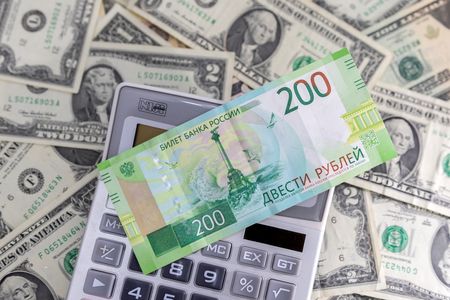 1
1 1
1

By Davide Barbuscia and Karin Strohecker
NEW YORK (Reuters) – Investors hit by Russia’s debt default may have to settle some of their positions privately if the U.S. Treasury does not green-light an auction that would allow billions of dollars of insurance to be paid out.
Russia last month defaulted on its international bonds for the first time in decades under the pressure of Western sanctions. While investors have already written down a large part of their debt holdings, an outstanding question is how they can recoup some of those losses through credit default swaps (CDS) – an insurance against defaults. A large chunk of those CDS are held by U.S. bond giant PIMCO.
“If this is not resolved for months and months, maybe there is an opportunity to settle in a private way,” said Yerlan Syzdykov, global head of emerging markets and co-head of emerging markets fixed income at Amundi, who owns both Russia bonds and CDS.
An auction would normally be held to determine the price of the underlying bonds, but the Treasury’s Office of Foreign Assets Control (OFAC) last month banned U.S. investors from buying any Russian securities in secondary markets. That’s clouded the outlook for an auction and sent investors searching for alternatives.
“This is unprecedented” in the CDS market, said Gregory Chartier, a senior associate at law firm Clifford Chance.
Syzdykov said his firm was working with lawyers to explore alternative plans, “and then maybe start negotiating directly with counterparties and determine some kind of a settlement solution outside of the auction process if it were not to happen.”
A lawyer familiar with the situation said should the terms of the contracts not be viable due to sanctions, CDS investors and issuers could try to settle through bilateral negotiations.
Because it would be illegal under OFAC guidance for a U.S. seller of protection to receive Russian bonds through a so-called physical settlement, a possible solution would be a cash settlement, in which the price of the bonds is established by seeking quotes from dealers, said Chartier.
One of the largest parties exposed to CDS is PIMCO, which manages $2 trillion in assets and had “sell protection” notional exposure to Russian CDS of around $1 billion as of the end of March, meaning it could have to pay up to that amount in case of a credit event.
PIMCO also had over $1.5 billion of Russian government bonds as of the end of March, although their market value by then had dropped to roughly $180 million.
For CDS issuers the payout could have been an opportunity to get delivered bonds that are now trading at huge discounts and cling to hopes they could gain value should the Ukraine crisis find a resolution, financial sources have said.
PIMCO declined to comment.
AUCTION PROCESS
When CDS pay out, bond investors have the right to hand over their bonds to the CDS seller and receive 100% of the bond’s par value in return, but if they don’t actually have the bonds, they need to buy them from someone who does.
That process is facilitated by what is known as the CDS bond auction, when participants look at the bond markets and work out the value of the underlying bonds.
The bond market equivalent of an insurance payment arbiter is the Credit Derivative Determinations Committee (CDDC), which in June deferred the decision on holding an auction to allow investors to assess OFAC guidance.
Investors and lawyers have said it would likely be trying to find a solution with OFAC that would allow for CDS settlements. The U.S. Treasury declined to comment and the CDDC did not respond to a comment request.
There are $2.54 billion of net notional CDS outstanding in relation to Russia, according to recent JPMorgan calculations.
Russia failed to pay $1.9 million of extra interest on a bond payment in May, which the CDDC established was a “credit event,” meaning it would trigger the payment of Russian CDS.
Since then, the CDDC, which includes fund managers and banks, has issued several statements postponing a decision on how to hold an auction. On Wednesday it said it would meet again next week.
“No one really knows what will happen if the auction can’t go forward,” said the lawyer familiar with the matter. “I think everyone is nervous.”
(Reporting by Davide Barbuscia in New York, Karin Strohecker and Jorgelina do Rosario in London; editing by Megan Davies and Leslie Adler)